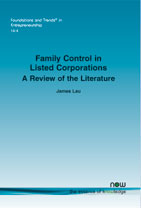Family Control in Listed Corporations: A Review of the Literature
By James Lau, Macquarie University, Australia, james.lau@mq.edu.au
Abstract
This monograph reviews 76 published empirical studies in relation to listed family corporations. Existing empirical evidence shows that a substantial proportion of listed corporations around the world are classified as family firms. Family shareholders are characterized as large, undiversified and with long-term investment horizons. These unique attributes are expected to have significant impacts on corporate behaviors. This monograph reviews the impact of family control on firm performance; financing and investment; corporate disclosures; corporate governance; and various socio-economic issues. Limitations of existing empirical studies and future research directions are provided.
Family Control in Listed Corporations:
Given the significant representation of family firms across most major listed exchanges, there have been growing numbers of empirical studies in recent years that examine the impact of family control on corporate behavior. Family Control in Listed Corporations aims to synthesize selected published empirical studies in relation to listed family corporations. It discusses the empirical findings, evaluates the contribution of existing empirical studies, identifies the limitations of these studies, and provides future research directions. The review contributes to the family business literature in two ways. First, it discusses the empirical findings and it evaluates the contribution of existing empirical studies. Second, this monograph identifies the limitations of existing empirical studies and it provides future research directions.
After the introduction, Section 2 discusses whether family control affects firm performance. Section 3 reviews studies of the preference of family firms for various leverage and financing methods. This section also discusses the investing activities in family firms, which include diversification, merger and acquisition, and research and development. Section 4 examines empirical evidence in relation to the corporate disclosure practices of family firms. Section 5 reviews the empirical studies of various corporate governance issues in family firms, which include the role of independent directors and institutional investors, and the use of control enhancing mechanisms by family shareholders. Section 6 considers the impact of family control on some socio-economic issues such as economic development, tax evasion and corporate downsizing. Finally, Section 7 discusses the limitations of the existing body of literature and provides suggestions for future research directions.
